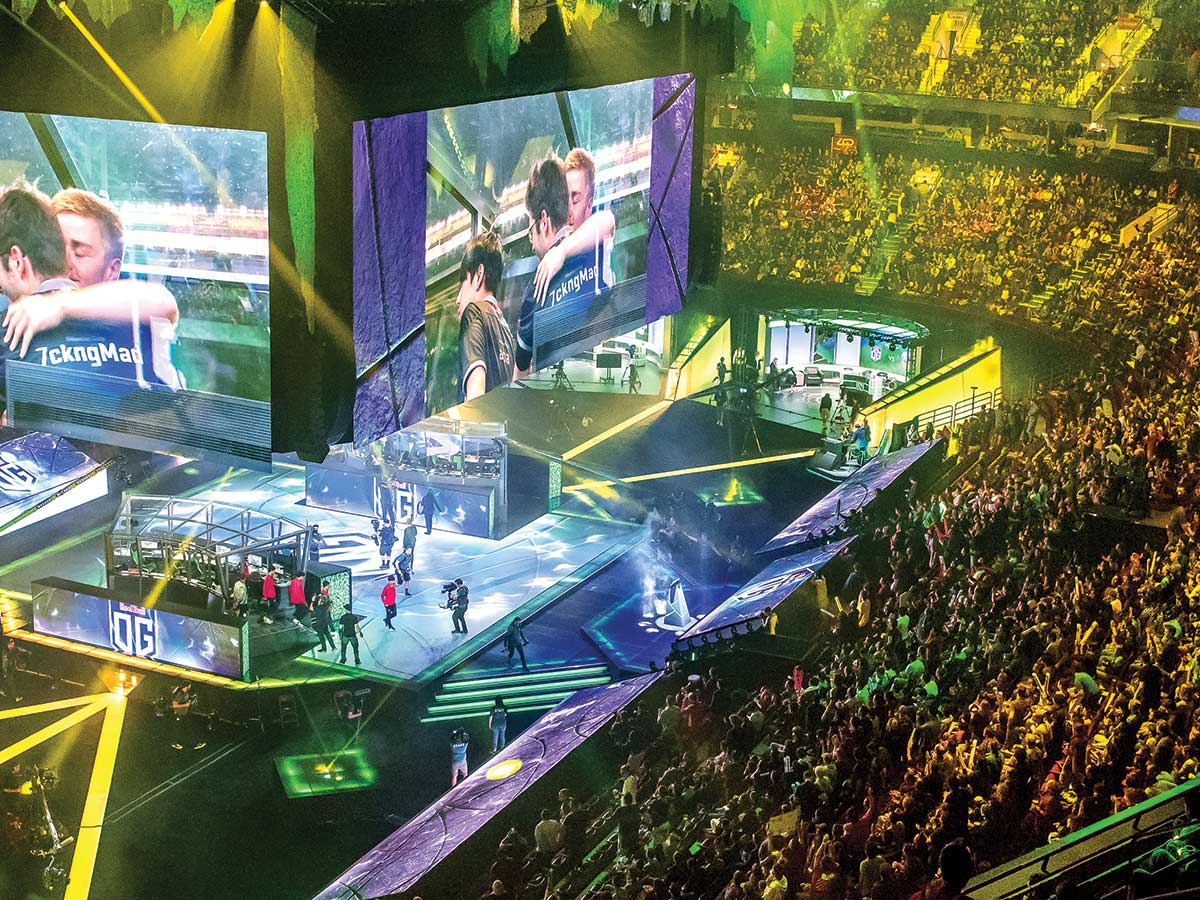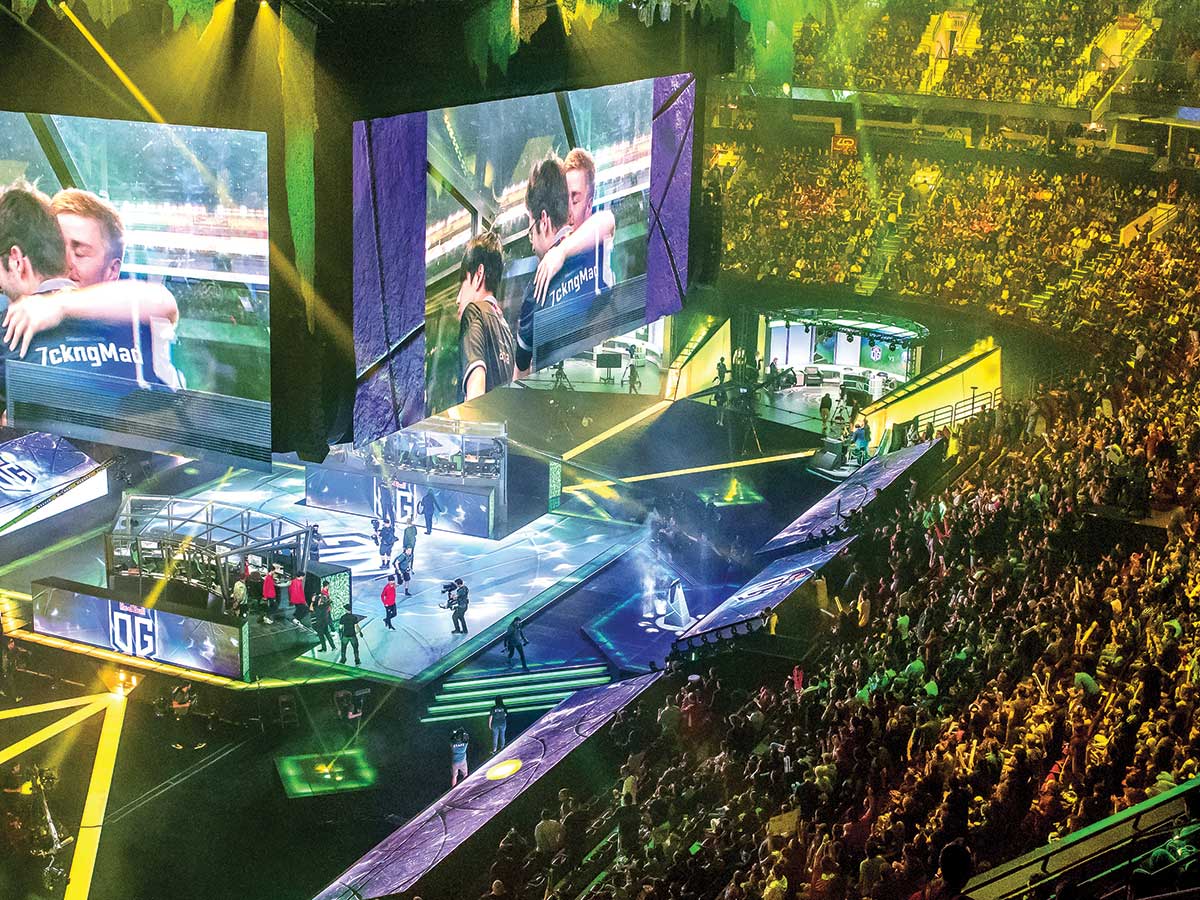
Esports is booming—and the industry needs CPAs
 The fired-up crowd at Vancouver’s Rogers Arena (Image courtesy of Red Bull)
The fired-up crowd at Vancouver’s Rogers Arena (Image courtesy of Red Bull)
On a rainy day last August, more than 18,000 fans packed Vancouver’s Rogers Arena, cheering and waving flags. But they weren’t there for their hometown hockey team. Instead, the capacity crowd had come to watch one of the biggest video-gaming tournaments on the planet. The arena roared as announcers introduced the teams about to face off in the multiplayer fantasy game Dota 2 for an $11.2-million (U.S.) prize. At centre stage, the contestants took their places at gaming computers and started playing, the Jumbotron above them mirroring all the onscreen action: knights, wizards and archers trading blows with mythological beasts.
That tournament and others like it around the world are part of a fast-growing phenomenon called esports, competitive video gaming for titles and cash prizes. According to the esports analytics firm Newzoo, 1.5 million Canadians now watch esports at least once a month. Typically, they do so on Twitch, a streaming service that lets viewers watch gamers play live, in real time, and which Amazon bought in 2014—an early sign of esports’ ascendancy. Star gamers—like undisputed esports king Tyler “Ninja” Blevins, who streams gameplay for several hours nearly every day—compete in globe-spanning leagues for sponsorships and prize money; $150.8 million (U.S.) was up for grabs in 2018 alone.
Global esports revenues are expected to total $1.1 billion (U.S.) in 2019, a year-on-year growth of 26.7 per cent. And by 2022, that figure is projected to be nearly $1.8 billion (U.S.), factoring in sponsorships, media rights, advertising, merchandise and ticket sales. In short, esports is transforming from a niche novelty into a full-fledged media and entertainment industry—and Canadian CPAs are already cashing in.
 Deloitte’s Luc Ryu (Nathan Cyprys)
Deloitte’s Luc Ryu (Nathan Cyprys)
Luc Ryu, a 24-year-old CPA and senior associate with Deloitte’s valuation services group in Toronto, is a self-proclaimed esports enthusiast. He grew up playing Counter-Strike, a popular first-person shooter, and watching his favourite gamers’ highlight reels. Whenever he visited relatives in South Korea, he was struck by how competitive gaming was embedded in mainstream culture. “It’s been normalized for such a long time,” says Ryu. Major tournaments are commonplace in South Korea and China, where esports-specific stadiums seat upwards of 7,000 fans. “People don’t think it’s just a bunch of nerds playing games like they do in North America.”
Though esports leagues and video-gaming bars have sprouted up across Canada, Ryu realized esports still weren’t being taken seriously as a business opportunity—mostly because North American investors didn’t understand the industry. So, he set out to change that. In December 2018, working for Deloitte’s in-house creative propositions consultancy Market Gravity, he helped launch a five-week study of the esports industry. “The goal was to educate people,” he says.
The publicly available report, called “D5,” argues that there’s untapped value in all those eyeballs watching esports, and offers several ways for interested businesses to enter the market, including sponsorships, tournaments and player development. Since the report was released earlier this year, Ryu says, financial institutions and investment groups have come to his firm to explore market-entry strategies and investment financing options. He points out that in such a new and unfamiliar market, the Big Four are viewed as trustworthy by those looking to retain help.
Christopher Malone, a 58-year-old CPA in the Greater Toronto Area, had to learn on the job. Before he became CFO of the American video-game gambling company Esports Entertainment Group, he knew almost nothing about esports. But he saw a new industry and wanted in. “Esports is going to become very much like traditional sports,” he says. “The opportunity to get into a fresh and challenging new sector is a really exciting change of pace.”
“In South Korea, people don’t see it as nerds playing games like they do in North America”
Toronto lawyer Evan Kubes also saw an opportunity in the fledgling space. He noticed an absence of “the picks and shovels of esports”—that is, the lawyers, accountants, agents and other professionals necessary to support the industry. Without such services, young and inexperienced pro gamers were signing terrible contracts they didn’t understand—or even read. “Esports is still in its infancy,” says Kubes. “You’re seeing a lot of capital being invested in sexy stuff like new teams and leagues, but the foundation isn’t keeping pace.”
That’s why Kubes left his medical malpractice litigation job and co-founded MKM Esports, Canada’s first esports-dedicated law firm and business management agency. Since it launched last October, MKM has signed more than 200 teams, players and streamers worldwide. The firm offers its clients full legal services, as well as sponsorship and consulting services for the capital market, such as financial institutions keen on investing in esports.
But there are roles Kubes can’t fill. A Montreal mother recently called MKM asking about the tax implications of her 17-year-old son playing for teams in both Canada and the U.S. “I’m not an accountant,” Kubes says. “There’s an opportunity in those cases to have a specialist CPA help clients navigate this space.” Ryu, a CPA with a lifetime of gaming experience, may be one such specialist. “When people look at the Big Four, they typically think of audit or tax,” he says. But the emergence of esports as a legitimate industry has opened up new avenues for CPAs who are willing to think outside the Xbox.